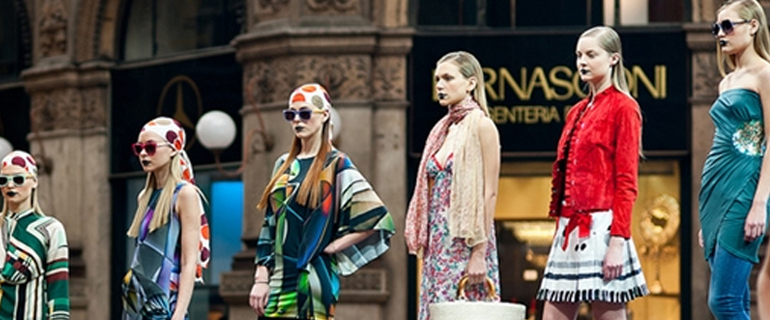
Ba (Hons), Fashion Design and Textiles
Fashion innovative style through creative thinking, theory and practice.
This programme focuses on the design and construction of the fashion garment, addressing physical, aesthetic, social, cultural and environmental issues within a contemporary fashion context. Using a mix of traditional and contemporary approaches, together with a strong understanding of theory, you will learn how to translate ideas from paper to the final object.
You will engage in practical workshops that encourage independent learning through intellectual and creative processes. Industry projects, collaborations and dialogues are encouraged to maximise your relationships within the programme, the College and with other institutions. Through a variety of projects and directed independent practice, you learn to analyse, evaluate and make creative and practical decisions. The philosophy of the programme is innovating fashion through creative thinking, theory and practice. Through a combination of components (studio, creative and contextual studies modules), you will develop a range of analytical, communication and problem-solving skills to become articulate, meticulous and thoughtful practitioners in the field of fashion.
This programme offers two specialisms:
Concentrates on designing collections for a wide range of contemporary market sectors such as casual, office, sports, evening and resort wear.
Focuses on the usage of traditional tailoring techniques, combining pattern drafting to design contemporary menswear collections that address different layers of the men’s market sectors such as casual, office, sports, bespoke and work wear.
The two specialisms are grounded in one of the following design directions which you will opt for in-depth studying at Level 2 of the programme:
Explores advanced techniques of drafting and draping, as well as complex cutting and sewing techniques. The focus is on developing a thorough understanding of garments construction and making, with a strong understanding of the contemporary fashion industry.
Explores a wide range of aspects of textiles design, ranging from established artisanal techniques to contemporary innovative digital approaches. You will have the opportunity to explore the creative areas of textiles through the principles of colour, form, texture, scale, pattern and composition.
Course Details –
Duration: 3 years
Mode: Full Time
Modules:
Level 1
You will be presented with the different disciplines and theoretical approaches needed for the study and exploration of fashion.
Level 2
You will learn to analyse, in theory and practice, a range of different fashion elements and fashion critique. Additionally, you will apply and test your own creativity drawing on diverse critical and cultural theories. You will also have the option to undertake a semester of overseas student exchange to gain a global perspective and enrich your learning experience.
In fulfilment of this module, you can choose one of the following options:
You will independently source and apply for internship opportunities. You are required to identify your interest and career-trajectory. These opportunities should be in an organisation where the job functions are related to your discipline.
The internship may be with a single organisation or an accumulation of short-term work with different companies, to accumulate the minimum 200 hours of on-the-job training. The internship may be spread across a number of days/weeks and need not be a full-time position. Where possible, you are encouraged to go beyond the minimum hours in order to showcase your talent and abilities, which will aid your quest for permanent employment and/or gain more opportunities to learn about the job and industry.
All internships must be approved by the Programme Leader, prior to commencement, to align with learning aims and outcomes.
You will take a proactive and entrepreneurial approach to identify and create a niche for yourself, within the cultural and creative industries. You may undertake a combination of the following types of projects:
Industry Live Project: You can source for an industry project, or this can be facilitated through the programme.
Entrepreneurial Project: You may devise a business proposal and execute it.
Community Engagement Project: You can engage with a community
To ensure that you fulfil the learning outcomes of this module, all proposals and short-term internship opportunities must be discussed and approved by the Programme Leader.
You will learn to manage the design process, defining project development stages and benchmarks. You will undertake interim evaluations, tests and experiments that influence and inform the final design outcomes. You will have to present part or all of your design process and outcomes to different audiences, and engage in critical dialogues with both peers and industry collaborators. This will help you get a broader perspective of your undertaken project in order to objectively take design decisions.
Attend lectures, seminars, technical workshops, tutorials and practical presentations. There will be guest lectures by fashion industry experts who bring valuable experience and advice. You will make industry visits, engage in market research and undertake a fashion internship. During studio work, you will develop practical projects (individually or in groups) that enhance your student experience and prepare you for a future design career.
InternshipYou will independently source and apply for internship opportunities. You are required to identify your interest and career trajectory. These opportunities should be in an organisation where the job functions are related to your discipline.
The internship may be with a single organisation or an accumulation of short-term work with different companies, to accumulate the minimum 200 hours of on-the-job training. The internship may be spread across a number of days/weeks and need not be a full-time position. Where possible, you are encouraged to go beyond the minimum hours in order to showcase your talent and abilities, which will aid your quest for permanent employment and/or gain more opportunities to learn about the job and industry.
All internships must be approved by the Programme Leader, prior to commencement, to align with learning aims and outcomes.
Womenswear Designer, Menswear Designer, Fashion Textile Designer, Pattern Cutter, Production Manager, Costume Designer, Accessory Designer, Merchandiser, Fashion Educator, Fashion Buyer, Stylist or Creative Director.
ACADEMIC REQUIREMENTS
India
Qualifications Remarks
Indian School Certificate (ISC) by Council for the Indian School Certificate Examinations (CISCE) Standard 12 3 subject passes, including English, at Grade 1-6
All India Senior School Certificate Examination by Central Board of Secondary Education (CBSE) 3 subject passes, including English, at Grade A1-C2 Accreditation of Prior Learning (APL) india
Minimum Requirements for Entry into a BA(Hons) Level 2 Programme
A relevant diploma in the field or discipline.
Your portfolio or audition must be exceptionally strong and demonstrate prior formal training in the relevant arts discipline. The transcript from your diploma course must demonstrate that you have read and passed the equivalents of essential university modules.
Entry Into IELTS TOEFL - iBT
BA(Hons) 6.0 80
ADMISSIONS TESTS/PORTFOLIO AND INTERVIEW REQUIREMENTS
Write a story of a journey you have made, it can be real or fictional. This journey will provide the inspiration for the following fashion design sketches. (1 x A4 page, 350 words)
Illustrate the journey in the shape of a visual collage using any technique / combination of techniques, using existing pictures or original photographs taken by you, drawings, textiles. This collage will be the inspiration for the following fashion sketches. (1 x A3 pages)
Draw 10 fashion sketches strongly articulating the mood and aesthetic of the visual collage. The sketches should be developed in full colour in a technique / mix of techniques of your choice (hand drawing with pencil, markers, water colour or digital illustration) in order to convey the texture, volume and shadow, garment details and construction, textile prints and any accessories that would make each look complete. We recommend that you use fabric swatches and/or photographs of fabrics to show what material you would like to utilise to make each designs. (10 x A3 pages – one sketch / page)
Compile an A3 file of other examples of your art and design work which must contain any of the following: observational / life drawings, paintings, photography, collage, photographs of styling exercises, digital illustrations, textile manipulations done by you, 3D mock-ups, fashion toiles (toile = a garment sample made in a testing material usually in a light plain colour), fashion garments (fully finalised or in progress), accessories or any other materials (fashion-related) to support your applications.
All portfolios must be saved in a PDF format on a memory stick.
Other formats such as videos, PowerPoint slides, and Word documents are not acceptable.
COMPONENTS
TUITION FEES (PER ANNUM)
BACHELOR OF ARTS (HONS) TUITION FEES FOR AUGUST 2020 INTAKE (PER ANNUM FEES)
Pls note registration for August 2020 will be open on October 2019
Funded (Subsidised Fees) Non-Funded (Full Fees)
International students
$23,800 (INR Rs 12.5 lakhs approx.)
APPLICATION FEES
A non-refundable application fee (inclusive of 7% GST) is chargeable per application. Application is only complete upon receipt of your application fee and all necessary documents. Please ensure your application fee is paid and documents are submitted within seven working days from the submission date of your online application. UNIVERSITY reserves the right to withdraw the applicant if the application fee remains unpaid and documents are not received by the due date.
International Applicants
$120 (INRs 6240 approx currency exchange rates)
ADDITIONAL COSTS:
Basic materials for learning are provided by the College.
As a developing artist, you are required to have certain items that are personal to you and cannot be shared. Such items include books, dance shoes, rehearsal clothes, safety boots, portable musical instruments, paints, canvas, basic tools, design software, cameras, etc., that will support you through your three-year learning journey. The College does not encourage the purchase of extravagant or costly materials or equipment. Our lecturers can provide you with affordable suggestions.
You are also encouraged to have your own laptop for education. If you do not own one, computer labs are available on campus with requisite software for you to undertake your work.
There may be opportunities for you to undertake extra-curricular study trips to enhance your overall learning. Trips are not compulsory and may incur additional costs.
Fee Protection Scheme (FPS)
Fee Protection Scheme (FPS) serves to protect students’ fees in the event a Private Education Institution (PEI) is unable to continue operations due to insolvency and/or regulatory closure. The FPS also protects students when the PEI fails to pay penalties or refund fees to the students arising from judgements made against it by the Singapore courts.
Accepted Modes of Payment
All payment must be made in Singapore Dollars.
DBS Online Banking and ATM Transfer
GIRO
Cheque/ Bank Draft/ Cashier's Order/ Demand Draft
NETS
Cash
Master/ Visa/ China UnionPay
Wired Transfer/ Telegraphic Transfer (Only for International students)
The student lodging, fooding and travel is approximately around SGD$ 1200 (Rs 61,166)

